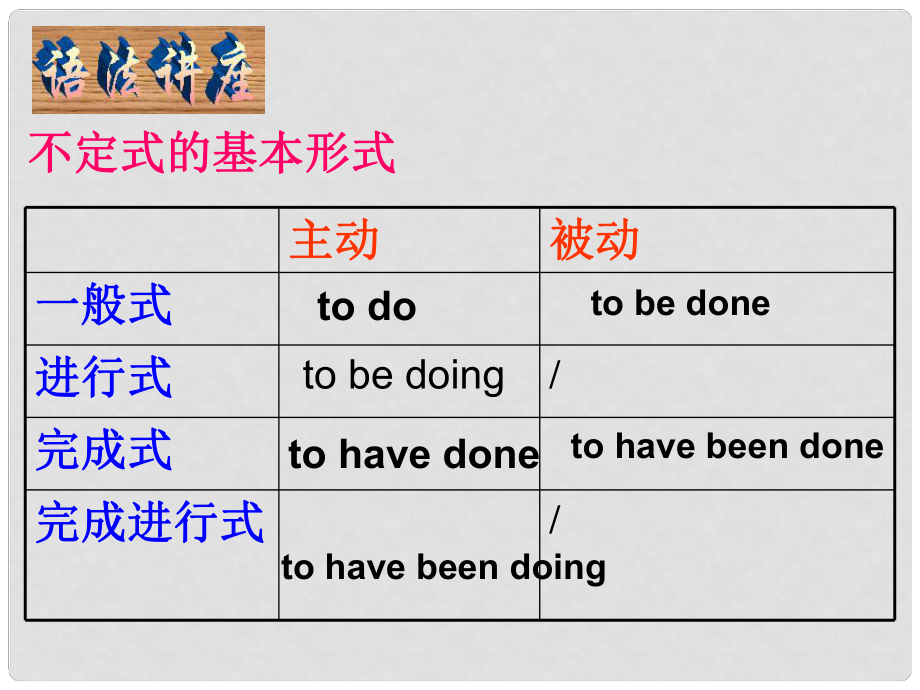《浙江省甌海區(qū)三溪中學(xué)高考英語(yǔ)語(yǔ)法復(fù)習(xí) 不定式的被動(dòng)語(yǔ)態(tài)課件 新人教版》由會(huì)員分享��,可在線閱讀���,更多相關(guān)《浙江省甌海區(qū)三溪中學(xué)高考英語(yǔ)語(yǔ)法復(fù)習(xí) 不定式的被動(dòng)語(yǔ)態(tài)課件 新人教版(22頁(yè)珍藏版)》請(qǐng)?jiān)谘b配圖網(wǎng)上搜索。
1�����、主動(dòng)主動(dòng)被動(dòng)被動(dòng)一般式一般式進(jìn)行式進(jìn)行式/完成式完成式完成進(jìn)行式完成進(jìn)行式/不定式的基本形式不定式的基本形式to doto be doingto have doneto have been doingto be doneto have been doneDiscovering useful structuresGo over the passive voice 當(dāng)不定式的邏輯主語(yǔ)是這個(gè)不定式所當(dāng)不定式的邏輯主語(yǔ)是這個(gè)不定式所表表示的動(dòng)作的承受者時(shí)��,一般要用不定示的動(dòng)作的承受者時(shí)����,一般要用不定式式的被動(dòng)式���。不定式的被動(dòng)式可以在句的被動(dòng)式���。不定式的被動(dòng)式可以在句中中作主語(yǔ)�����、作賓語(yǔ)、作表語(yǔ)����、作定語(yǔ)、
2����、作主語(yǔ)、作賓語(yǔ)����、作表語(yǔ)�、作定語(yǔ)、作狀語(yǔ)�。作狀語(yǔ)���。1. Its an honour to be invited to the ceremony.2. She didnt like to be treated as a child.3. His dream was to be admitted to a good university.4. There are a lot of things to be discussed.5. She was sent there to be trained for the space flight.作主語(yǔ)作主語(yǔ)作賓語(yǔ)作賓語(yǔ)作表語(yǔ)作表語(yǔ)作定語(yǔ)作定語(yǔ)作狀語(yǔ)作狀語(yǔ)不
3����、定式的被動(dòng)式在句中作什么成分不定式的被動(dòng)式在句中作什么成分He thought it an honour to have been invited to the party. (復(fù)合賓語(yǔ))(復(fù)合賓語(yǔ))The book is said to have been translated into many languages. (復(fù)合謂語(yǔ))(復(fù)合謂語(yǔ))She was the first woman to have been elected to such a post. (定語(yǔ))(定語(yǔ)) 不定式有時(shí)要用主動(dòng)形式表示被動(dòng)意義不定式有時(shí)要用主動(dòng)形式表示被動(dòng)意義1. 不定式的不定式的邏輯主語(yǔ)和邏輯賓語(yǔ)都出
4�����、現(xiàn)邏輯主語(yǔ)和邏輯賓語(yǔ)都出現(xiàn)在不定式前面�����,只能用主動(dòng)形式在不定式前面,只能用主動(dòng)形式����;若�;若在句中在句中找不到不定式的邏輯主語(yǔ),則找不到不定式的邏輯主語(yǔ)����,則用不定的被動(dòng)形式用不定的被動(dòng)形式。如:��。如: Do you have anything to wash today? (to wash的主語(yǔ)為句子的主語(yǔ)的主語(yǔ)為句子的主語(yǔ)you����,其,其邏輯賓語(yǔ)為邏輯賓語(yǔ)為anything���。) 你今天要洗什么嗎?你今天要洗什么嗎�����?Do you have anything to be washed? (to be washed不是不是you做�����,而是由做���,而是由“我我”或其他人來(lái)做或其他人來(lái)做)你有什么要其他人洗的
5��、嗎?你有什么要其他人洗的嗎?2. 在在There be/ seem+主語(yǔ)主語(yǔ)+to do表示存表示存在的句型中的不定式����,一般用主動(dòng)形在的句型中的不定式,一般用主動(dòng)形式表示被動(dòng)意義式表示被動(dòng)意義(也就是說(shuō)��,我們可(也就是說(shuō)�,我們可能會(huì)見到被動(dòng)形式�����,但主動(dòng)形式要好能會(huì)見到被動(dòng)形式���,但主動(dòng)形式要好得多)����。得多)。 There is a lot of homework to do(也可用也可用to be done)Theres no chair to sit on. (The chair is sat on.)沒(méi)有椅子坐���。沒(méi)有椅子坐����。但在下列句子中,只能用主動(dòng)形式�。如:但在下列句子中�,只能用主動(dòng)形式�。
6、如: Theres not enough food for us to eat.我們沒(méi)有足夠的食物吃��。我們沒(méi)有足夠的食物吃��。3. 在在形容詞以及含有形容詞的名詞后的不形容詞以及含有形容詞的名詞后的不定式�����,一般用主動(dòng)形式表示被動(dòng)意義����,定式��,一般用主動(dòng)形式表示被動(dòng)意義�,其中形容詞常見的有其中形容詞常見的有easy, difficult, important, impossible等。如:等��。如: The work is impossible to finish in two days. (The work is finished.) 工作不可能兩天之內(nèi)完成。工作不可能兩天之內(nèi)完成���。 English
7、 is not so easy to learn. (English is learnt.) 英語(yǔ)并不好學(xué)���。英語(yǔ)并不好學(xué)�����。4在在“with+n+to do”結(jié)構(gòu)中。結(jié)構(gòu)中��。例如:例如:With nothing to do�,he lay in bedWith so many exercises to do,I cant go to the cinema5.在一些固定用法�����,如在一些固定用法�,如“挨罵,受責(zé)備���,挨罵���,受責(zé)備����,受批評(píng)受批評(píng)” 用用be to blame;“(東西等)(東西等)出租出租”用用to let��。如:如: He is to blame for what he has done.
8�、他應(yīng)為他所做的受責(zé)備�����。他應(yīng)為他所做的受責(zé)備�����。 The house is to let. 房子要出租�。房子要出租。1. (2007遼寧卷遼寧卷)The crowd cheered wildly at the sight of Liu Xiang, who was reported _ the world record in the 110-meter hurdle race.A.breaking B. having brokenC. to have broken D. to break2. (2008全國(guó)卷全國(guó)卷I)I like getting up very early in summer.
9���、The morning air is so good _.A.to be breathed B. to breatheC. breathing D. being breathed3. (2008湖南卷湖南卷)_ the project as planned, well have to work two more hours a day.A. Completing B. CompleteC. Completed D. To completeI. 根據(jù)括號(hào)內(nèi)的提示將下列句子補(bǔ)充根據(jù)括號(hào)內(nèi)的提示將下列句子補(bǔ)充完整。完整�����。1. He wanted the letter _ (type) at once
10、.2. It is the first such project _ (design) by Chinese engineers.to be typedto be designed 3. She didnt want her son _ (take) away.4. Do let your mother know all the truth. She appears _ (tell) everything.5. She is busy preparing for the exams _ (hold) next month.6. He hurried to the station only _
11�、(tell) that the train had left.to be takento have been toldto be heldto be told 1. It is said that plastics can be used to_ many things. Now people are used to_ plastics products. A. make; using B. making; using C. making; use D. make; useA 2. With a lot of problems_, the newly-elected president is
12���、having a hard time. A. settled B. settling C. to settle D. being settledC 3. The pupils here_ all kinds of exercises every day in the past four weeks. A. kept busy doing B. keep on doing C. have kept busy doing D. have been kept busy doingD 4. Visitors_ not to touch the exhibits. A. will request B. request C. are requesting D. are requestedD 5. In some parts of the world, tea _ with milk and sugar. A. is serving B. is served C. serves D. servedBHOMEWORKGo over words and expressions.Go over the grammar.Do Ex3 on Page 56.
 浙江省甌海區(qū)三溪中學(xué)高考英語(yǔ)語(yǔ)法復(fù)習(xí) 不定式的被動(dòng)語(yǔ)態(tài)課件 新人教版
浙江省甌海區(qū)三溪中學(xué)高考英語(yǔ)語(yǔ)法復(fù)習(xí) 不定式的被動(dòng)語(yǔ)態(tài)課件 新人教版

